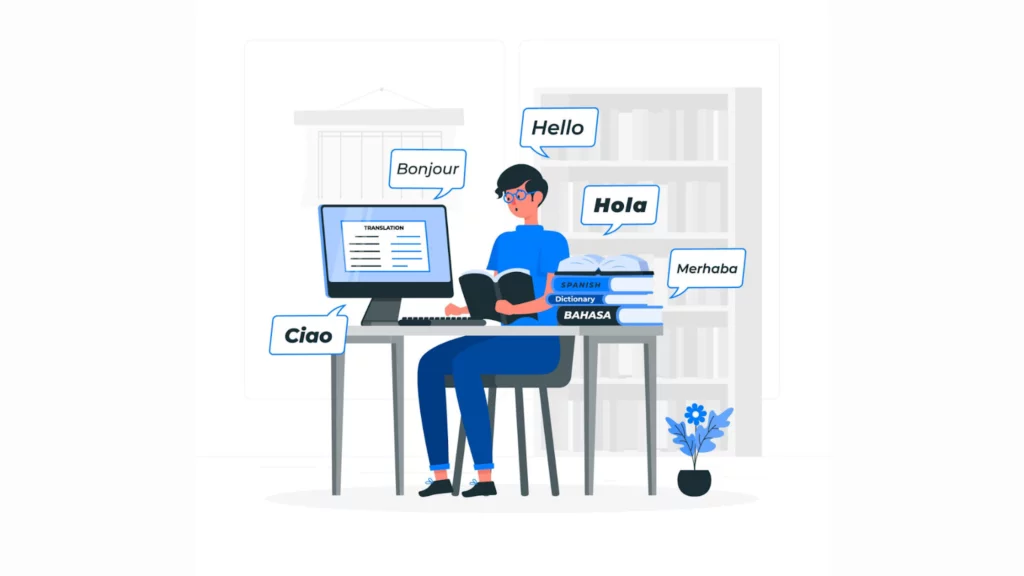
In the digital age, your website’s ability to draw in new visitors is more crucial than ever. Customers are often contacting your business through your website as their initial point of contact. Therefore, getting this right in the form of a multilingual website is essential for closing a deal, forging enduring bonds with clients, and fostering a strong sense of brand loyalty.
When you hear the word “personalization,” you may think of customized product recommendations, focused advertising, and related ideas. However, language is something we frequently ignore but is essential to personalization. Nowadays, it’s imperative to have your website and its content available in a language that users can understand, especially since 88% of consumers are unlikely to revisit your website after a negative experience.
This is where the multilingual websites comes into play!
8 Reasons Your WordPress Site Should Be Multilingual
Your website should be updated at the same pace as cross-border e-commerce and globalization.
From a competitive standpoint, having a multilingual website can revolutionize your company. This blog will examine how a multilingual website can help your business today.
Let’s begin!
1. It is more affordable to translate your website than to choose another route
Investing in a multilingual website is among the most affordable and dependable ways to grow your company.
Although a global marketing strategy may seem like a good idea, it is not guaranteed to succeed and is very expensive. Meanwhile, hundreds of thousands of businesses are successfully using the strategy of translating their company websites.
Estimating the precise cost of developing a multilingual website used to be challenging, but this is no longer the case. Expert multilingual site developers can help you create a multilingual website that loads quickly, looks great, is safe, and never crashes.
2. Multilingual webistes lower the bounce rate
Online shoppers are more likely to spend time on websites written in a language they can comprehend. Before clicking the “Buy” button, customers should ensure they understand everything they’ve read and the steps involved in purchasing.
Foreign customers are less likely to quit your website immediately if it is available in multiple languages, even if they need assistance understanding it. Reducing bounce rates can increase sales significantly.
3. Boosts website traffic
A multilingual business website with excellent SEO will draw more visitors from all over the world.
A translated website will attract more visitors within weeks. For example, when Neil Patel translated his content into 82 languages in three weeks, search traffic increased by 47%. Additionally, he pointed out that there were more impressions for search queries, which indicated potential for faster growth.
Naturally, having more visitors to your website increases the chances they will make a purchase, but translating it also has another unintended benefit.
4. Establish credibility and brand awareness
Increased visitors to your translated website translate into a higher brand awareness.
People from all over the world will visit your multilingual business website and begin to associate you with a particular good or service. You will stand out from the competitors if you do this. Consumers enjoy familiarity and will be more likely to return if they know your business.
Additionally, having a multilingual website enhances the legitimacy of your business. It’s widely acknowledged that a company that speaks several languages needs to be “global.” Similarly, customers will respect your grasp of their culture, and you will gain their trust if your website is fully localized.
5. Client-centeredness 
At the center of this customer-centric strategy is a multilingual website, as a business’s level of personalization becomes increasingly significant in securing customers and sales.
In particular, if this isn’t the standard among your rivals, your website visitors will feel acknowledged and grateful if you can offer them high-quality content in their native tongue. Their displays of gratitude and welcome will result in more tremendous commercial success.
6. Creating a Distinctive Competitive Edge
With the current state of the economy, businesses are under more pressure than ever to set themselves apart from the competition.
A multilingual website could boost international e-commerce sales, which could be crucial as we transition to a more e-commerce-focused retail environment.
Your business will make more money when it outperforms its competitors, accommodates customers’ needs, broadens its brand to reach a wider audience, and strengthens its reputation. The result of all of these is taking the competition by storm and controlling the market.
7. Global Search Engine Optimization
For those who may not be familiar with SEO, a company’s ability to rank highly on search engine result pages (SERPs) is a significant factor in determining its online success. Customers are more likely to view your website pages if they rank higher on SERPs, which will, of course, affect your final sales and earnings.
Of course, many of you may already be well-versed in SEO and excelling at it locally. Search engines highly value pages with multiple language versions as they are viewed as unique content and are consequently ranked higher.
To increase the chances that your website will rank well across all languages, you should translate every piece of content, including the meta tags.
Furthermore, it would be beneficial if every page had a distinct URL and a subdomain or category specific to that language. This will facilitate the process of search engine bots reading and ranking your content in particular languages.
8. It boosts your revenue
Increasing sales is ultimately what motivates a company to make any decision. One of the best ways to do this is to translate your website.
Yes, the majority of businesses do benefit from it. According to Sri Sharma of Net Media Planet, companies that translate their landing pages and advertisements see an average 20% increase in conversions.
One factor contributing to consumers’ increased propensity to buy is that websites are being viewed in their native tongue.
Conclusion
Embracing a multilingual approach for your WordPress site is a wise move that can significantly boost its reach and effectiveness.
Catering to a global audience by breaking language barriers broadens your user base and establishes a more inclusive and user-friendly online presence.
With its numerous benefits, from improved SEO to increased user engagement, going multilingual is a key step in ensuring your WordPress site remains competitive and relevant in the diverse internet landscape.
FAQs
Is it difficult to set up multilingual functionality on a WordPress site?
No, it’s not difficult. Various plugins, like WPML and Polylang, simplify the process, allowing you to translate content easily and manage different language versions seamlessly.
Will having a multilingual site impact its performance?
Not significantly. Modern multilingual plugins are designed to be lightweight and optimized. The impact on performance is minimal, especially considering the benefits of a broader audience reach.
Does having a multilingual site improve SEO?
Yes, it does. Search engines favor multilingual websites as they can reach a wider audience. It improves your site’s visibility in different regions and languages, positively impacting your search engine rankings.
Can I control the translation quality of my content?
Absolutely. While some plugins offer automatic translation options, you can also manually review and edit translations to ensure precision and maintain the quality of your content in different languages.
Are there any legal considerations when making my WordPress site multilingual?
Respect copyright laws and ensure that translations are accurate and don’t infringe on intellectual property rights. Additionally, consider privacy laws and regulations, especially if your site collects personal information from users in different regions. Always stay compliant with relevant legal frameworks.



